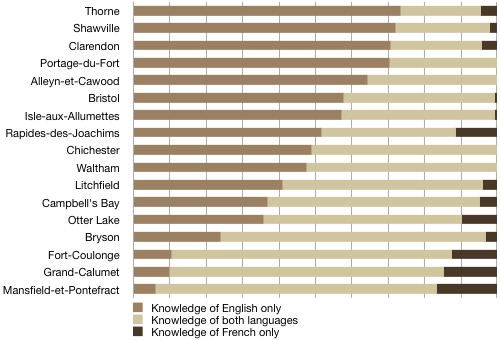The Pontiac’s language problem

This graph, based on 2006 census data, illustrates the problem the Pontiac has with language — namely, that a large portion of the population can’t understand French: in Shawville, Clarendon, Thorne and Portage-du-Fort, more than seven out of ten people cannot understand French; in Bristol and L’Isle-aux-Allumettes, it’s more than five out of ten.
On the other hand, looking at the mother-tongue stats, which I have not included above, most francophones are able to speak English. The more French-speaking municipalities are essentially bilingual: in Fort-Coulonge, Grand-Calumet and Mansfield more than three-quarters of the population self-identifies as bilingual; in each case, fewer than one in six cannot speak English.
So if you were to call someone at random in the 819-647-xxxx exchange (covering Shawville and Clarendon) and speak French, there is a seven in ten chance that the person you called would not be able to understand you. But if you were to call someone in the Fort-Coulonge area at random and speak English, there is only a one in six chance you wouldn’t be understood. This means that, for all practical purposes, English is the lingua franca of the Pontiac.
This is precisely the sort of scenario that gives Quebec nationalists fits.
I’ll be the first to argue that more anglophones in the Pontiac — and in general — need to be able to speak French. I just think it’s polite. Expecting your francophone neighbours to speak English is both obsolete and privileged — especially in Quebec, where it’s also politically explosive. And yet the facts on the ground remain: lots of people around here can’t understand French. And to be frank, some of them are, to put it bluntly, old — and they can’t be expected to change late in life.
So when the Office de la langue française comes around to check on local businesses, as they tend to do when the PQ is in power, the local reaction isn’t just stubbornness, or Pontiac Rhodesians asserting their privilege, although there is a bit of that. (Mind you, Pontiac anglos aren’t nearly as well-off as those from Westmount, so let’s be mindful of how we use “privilege” in this case.) It’s because they’re forcing people to conduct business in a language many of them don’t understand. Requiring a local business to print receipts in French when neither the staff nor the customer understand French — to take a very real local example — does not respect the facts on the ground.
It’s an intractable situation, at least for now. But things will look very different around here in a generation: I’m assuming that younger anglos are more likely to be bilingual.